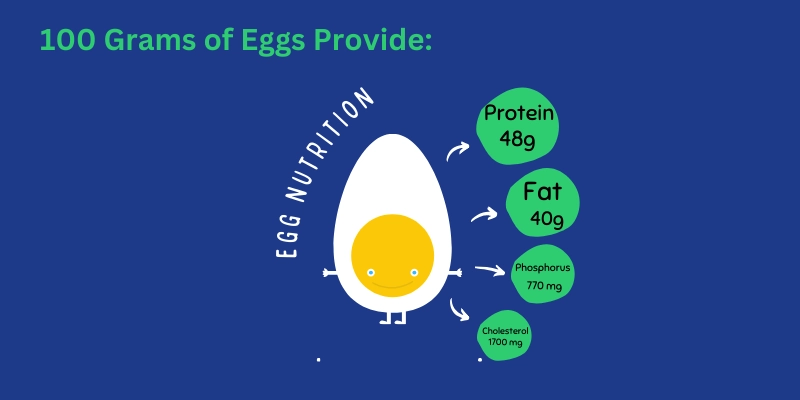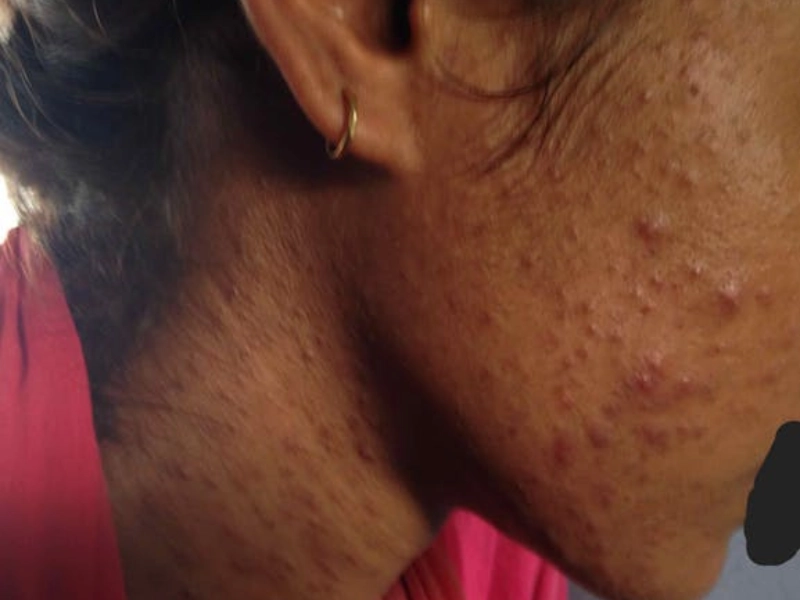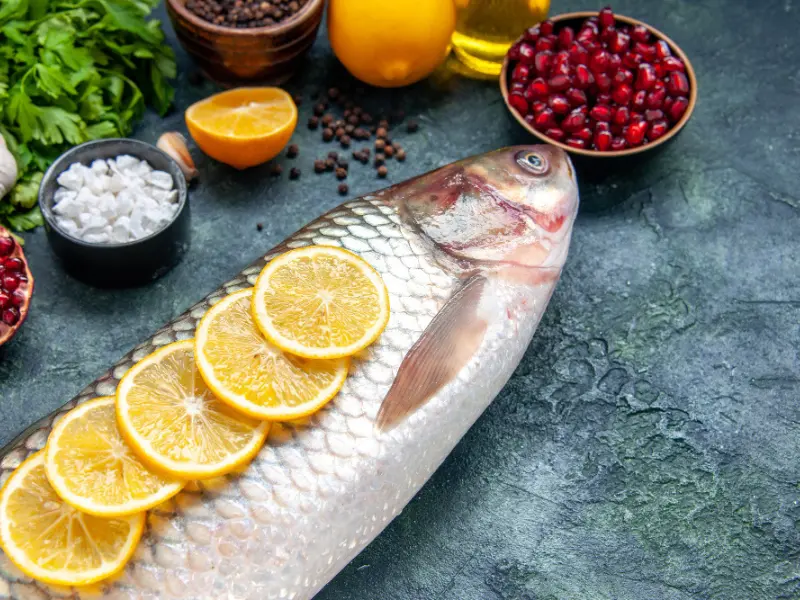Does Eating Eggs Cause Acne?
Published: 20 Mar 2025
Have you ever finished a big breakfast with eggs, only to wonder later, “Does eating eggs cause acne?” You’re not alone! Many people are confused about whether eating eggs can actually cause acne, or if it’s just another food myth floating around.
In this article, we’ll clear the concept and help you decide if eggs could be affecting your skin, and if they are, how to reduce their impact.
1. Nutritional Breakdown of Eggs
The eggs you eat daily in the morning are a powerhouse of essential nutrients, offering a mix of proteins, vitamins, and healthy fats.

According to the USDA, 100 grams of eggs provide:
- Protein: 48.1 g
- Total Fat: 39.8 g
- Cholesterol: 1700 mg
- Vitamin D (D2 + D3): 9.7 µg
- Biotin (Vitamin B7): Present
- Vitamin A (Retinoids): Present
- Zinc: 5.02 mg
- Phosphorus: 770 mg
- Iron: 6.97 mg
- Selenium: Present
Eggs are packed with nutrients that support muscle and brain health, but what about skin? Could they be behind those stubborn breakouts? Let’s find out in the next section!
2. Does Eating Eggs Cause Acne?
Many people relate acne to other foods, such as mangoes, bananas, spicy meals, almond milk, rice, dairy, junk food or even peanut butter.
Let’s see whether eating eggs is the acne trigger or if it is only a myth.
While eggs are super nutritious, some research hints at possible links to acne, but nothing is black and white. Let’s break it down together.

2.1 Eggs and Hormonal Impact
Did you know that the egg yolks you eat contain trace amounts of hormones like progesterone?
- While this hormone plays a role in your body’s natural functions, it may influence oil production and trigger acne in some people.
- Scientific studies on this are mixed! Some people notice no effect at all, while others find that their skin flares up after eating eggs regularly.
2.2 Eggs and Food Sensitivities
Eggs can trigger inflammation in your body if you are food-sensitive to eggs, which can worsen your acne if you have acne-prone skin. Inflammation is one of acne’s biggest friends.
Tip: If you notice breakouts after eating eggs, keep a food diary to track patterns. It might help you spot whether eggs are the culprit!
2.3 Eggs and Insulin-Like Growth Factor (IGF-1)
Eggs, like other animal-based foods, can increase levels of Insulin-Like Growth Factor 1 (IGF-1) in your body. IGF-1 is a hormone produced in your body that may boost your oil (sebum) production and promote inflammation, both of which can worsen your acne.
While dairy products are more strongly linked to IGF-1 and acne, eggs might have a smaller, yet still notable, effect.
3. What Does Science Say?
Several studies show that diet plays a role in your acne.
- High-glycemic foods, sugary drinks, and dairy products have been linked to worsening breakouts.

- A 2016 review published in the Journal of the American Academy of Dermatology found a strong connection between dairy intake and acne. But here’s the thing—when it comes to eggs specifically, the research is far less clear!
- There’s limited direct evidence tying eggs to acne flare-ups. Most studies lump eggs into broader “animal product” or “Western diet” categories, which makes it hard to say if eggs alone are to blame.
3.1 What the Experts Say
Many dermatologists agree that acne triggers can be highly individual.
- The American Academy of Dermatology also notes that while diet can influence acne, no single food has been proven to cause acne in everyone.
Eggs are not a universal acne triggerDr Whitney Bowe, a well-known dermatologist
That’s why figuring out personal triggers (like eggs) often requires trial and error.
4. Should You Stop Eating Eggs If You Have Acne?
That’s the big question, right? For some people, removing eggs from their diet has helped clear their skin. But for others? No difference at all!

Here’s why: everyone’s skin is unique. While one person may break out after an omelette, another might enjoy eggs daily without a single pimple.
4.1 Try an Elimination Diet (Safely!)
If you suspect eggs might be a trigger, consider trying an elimination diet. This means cutting out eggs for a few weeks and observing your skin closely.
4.2 Personalised Nutrition Is Key
Remember, there’s no one-size-fits-all solution when it comes to diet and acne. What works for your friend may not work for you. Your skin’s response is personal, and the only way to know for sure is by experimenting carefully.
Pro Tip!
Don’t just focus on eggs—look at your whole diet. Hydrate well, eat plenty of colourful fruits and veggies, and include healthy fats like nuts, seeds, and olive oil. These habits support clearer skin overall.
While eggs might play a role for some, they’re not the only food under the acne spotlight! Several other common culprits are often linked to breakouts.
- Sugar & High-Glycemic Foods: Foods like white bread, sugary drinks, and sweets you eat can spike your blood sugar—and that may trigger more oil production and inflammation.
- Dairy Products: Milk, cheese, and other dairy items have been linked to acne in many studies. Some believe hormones in dairy might be to blame.
- Processed & Fast Foods: Greasy burgers, fries, and other ultra-processed meals may fuel skin inflammation and clogged pores.
| 6. Tips for Clearer Skin Through Diet |
|---|
Want your skin to glow from the inside out? Sometimes, small changes to your plate can help reduce breakouts and keep your skin happy.
|

Still wondering if your favourite foods are messing with your skin? Dive deeper with our latest skin-friendly diet tips, your future clear skin will thank you!
7. Conclusion
So guys, in this article, we’ve covered Does Eating Eggs Cause Acne? in detail. In my experience, eggs alone don’t cause acne for most people, but they might be a trigger for some, depending on sensitivities and overall diet.
Personally, I’d suggest paying attention to how your skin reacts after eating eggs and balancing them with skin-friendly foods like fruits, veggies, and healthy fats. Curious to learn more about how diet impacts your skin?
Found this helpful? Share it with a friend who’s scared of eating Eggs
Yes! Eggs contain protein, vitamins A, D, and E, and antioxidants that help repair and nourish the skin. Regular consumption of a balanced diet may promote healthy, glowing skin.
Not necessarily, but they may not suit everyone. Some people experience breakouts due to egg allergies or inflammation, while others benefit from their nutrients. Pay attention to how your skin responds after eating eggs.
If eggs trigger breakouts, try eating them in moderation, drinking plenty of water, and balancing your diet with anti-inflammatory foods like fruits, vegetables, and omega-3s. A food diary can help track acne triggers.
Boiled eggs are less likely to trigger acne compared to fried eggs cooked in oil and butter. However, if you have a sensitivity to eggs, even boiled ones may cause mild inflammation or breakouts.
Yes, eggs are packed with essential nutrients like protein, zinc, and selenium, which help maintain skin elasticity and repair damaged cells. Including them in a balanced diet may improve skin health over time.
ggs help boost collagen production, keep the skin hydrated, and repair tissues due to their rich protein and vitamin content. They also contain antioxidants that fight free radicals, reducing premature ageing.
Egg white masks can absorb excess oil and temporarily tighten pores, which may help reduce acne. However, they can also be drying and irritating for some skin types. Always moisturize after using an egg mask to prevent dryness.
At MedicaWire, all medically sensitive content is reviewed by licensed healthcare professionals. Our team ensures that the information you read is accurate, up-to-date, and based on trusted medical sources.
👉 Learn how we maintain high standards by reading our Editorial Policy.
📚 Sources
- “Diet and acne: A systematic review,” National Center for Biotechnology Information (NCBI).
pmc.ncbi.nlm.nih.gov - “Impact of Diet and Nutrition in Patients with Acne Vulgaris,” National Center for Biotechnology Information (NCBI).
pmc.ncbi.nlm.nih.gov - “Eggs: Nutrition and Health Benefits,” Healthline.
healthline.com - “Eggs: Healthy or Risky? A Review of Evidence from High-Quality Studies,” National Center for Biotechnology Information (NCBI).
pmc.ncbi.nlm.nih.gov - “Eggs and their Positive Impact on Human Health,” DSM-Firmenich.
dsm-firmenich.com - “The relationship of diet and acne: A review,” National Center for Biotechnology Information (NCBI).
pmc.ncbi.nlm.nih.gov - “Eggs: Health benefits, nutrition, and more,” Medical News Today.
medicalnewstoday.com - “Health Functions of Egg Protein,” National Center for Biotechnology Information (NCBI).
pmc.ncbi.nlm.nih.gov - “Significance of diet in treated and untreated acne vulgaris,” National Center for Biotechnology Information (NCBI).
pmc.ncbi.nlm.nih.gov - “Acne Vulgaris and Intake of Selected Dietary Nutrients—A Summary of Evidence from Cross-Sectional Studies and Randomized Controlled Trials,” National Center for Biotechnology Information (NCBI).
pmc.ncbi.nlm.nih.gov
ℹ️ Our Promise
MedicaWire follows strict sourcing guidelines and only references peer-reviewed studies, academic institutions, and reputable medical associations. We update content regularly to reflect new health information.

- Be Respectful
- Stay Relevant
- Stay Positive
- True Feedback
- Encourage Discussion
- Avoid Spamming
- No Fake News
- Don't Copy-Paste
- No Personal Attacks



- Be Respectful
- Stay Relevant
- Stay Positive
- True Feedback
- Encourage Discussion
- Avoid Spamming
- No Fake News
- Don't Copy-Paste
- No Personal Attacks




